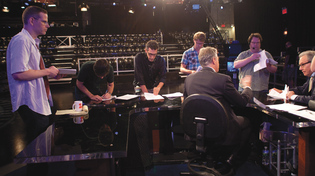 loading
loading
Funny business Mark OstowSteve Bodow (second from left) at a rehearsal of The Daily Show featuring Jon Stewart (seated with back to camera) and guest Lewis Black ’77MFA (far right). View full imageLast September, Bodow stepped up to the microphone to accept his eighth Emmy award. (He got his ninth later that evening.) He unfolded a sheet of paper and read, in the halting voice of someone just learning to read, “Thank you for the writing award. It is a very nice writing reward. The Academy is very good, so thanks for saying to us, ‘You are good at writing!’” It was something of an inside joke. The writers suspect some viewers think the show springs fully formed from the fertile mind of Stewart—as if the writers were charity cases Stewart had taken under his wing. Jon Stewart’s persona and sensibility are, to be sure, the centerpiece of The Daily Show’s success, and the main reason why the show’s influence only continues to grow. But the show’s writing—not only the jokes, but also the ideas and positions behind the jokes—is critical. If Daily Show writers’ meetings had minutes, sometimes they would read like the minutes of a debate society, as the room tries to hash out just what it feels about Mayor Bloomberg’s soda ban or Mitt Romney’s practices at Bain Capital. If you watch The Daily Show regularly, you know how some segments dredge from the murk of 24-hour cable news coverage little pearls of insight—moments that, on top of being very funny, require painstaking legwork and analysis. Bodow is often the one who steps back to ask, “What are we trying to say here?” As Miller puts it, “Even though our work is play, he takes the work very seriously, and cares very deeply about the quality of the craft.” Stewart agrees. “I think one real strength of his is clarification and concision. I’ll blather on about something, and Steve will get a little squint in his eye, and go, ‘Hmm… Does from really say it? Because it seems liketo. Or maybe over.’” Often the moments when The Daily Show is at its best, its most insightful, its most fluid—when the show seems utterly extemporaneous and natural—are the moments that were the most worried over, the most written. “There might be a piece where we’re going back over five years’ worth of coverage to pull out a journalistic trend and really parse what about it bothers us,” says Carvell. It’s a process of careful sifting, winnowing and strategizing, he says, but “hopefully, by the time it makes air, it looks effortless.”
Four o’clock rolls around, and it’s time for rehearsal. Bodow ducks into the studio just as Jon Stewart takes a seat at his iconic desk. (When Bodow introduces me—another tall, lanky Yalie—Stewart says, “There’s no SAT? Does Yale only admit ectomorphs?”) For the next 15 minutes or so, Stewart runs through the script while Bodow sits at an offstage desk, wearing a headset and watching a monitor to see how the show will play onscreen. Afterward, Bodow kneels in front of the desk and takes notes on Stewart’s ideas for cuts. Listening in, I fail to understand even a fraction of what they’re saying; they communicate with the mixture of workplace argot and quasi-telepathy that is the result of years of collaboration. “If you work with Jon for any length of time,” Bodow tells me later, “you learn to interpret the shorthand.” Stewart might say: Cut the thing and bring the thing around and do the thing. “‘Cut the thing’: you know what thing needs to be cut,” parses Bodow. “‘Bring the thing around’: there’s a thing that works, but it needs to move up in order to set up the ‘do the thing’ thing, which is probably the ‘blow,’ the big joke at the end. It takes time and repetition and patience and frustration, and suddenly you know how to bring the thing around and do the thing.” After years in the wilderness of freelancing and temping, to have such a close relationship with any boss, let alone America’s foremost satirist, is a new experience for Bodow. “I don’t think I ever held a job for more than a year before I got to this show,” he says, “and one big reason it’s worked out is that I’m working for someone I really respect.” It’s reciprocated. “It’s clear Jon has enormous respect for Steve,” says Miller. “If he pauses, looking for a word, and Steve provides the perfect phrase, it’s really a nice relationship to watch.” I ask Stewart to tell me something Bodow said that changed his mind. “There’s probably 20 of ’em in a day,” he says. The relationship shows no signs of ending soon: Stewart just signed a contract extension that keeps him on the air into 2015. And Bodow is happy. “He’s kind of a genius,” he says of Stewart, “and it’s amazing to work with him, even ten years into it. I recognize that it’s a rare moment too. This ten-year period has been politically so fucked up and amazing that it’s just a great time and place to be.”
The comment period has expired.
|
|